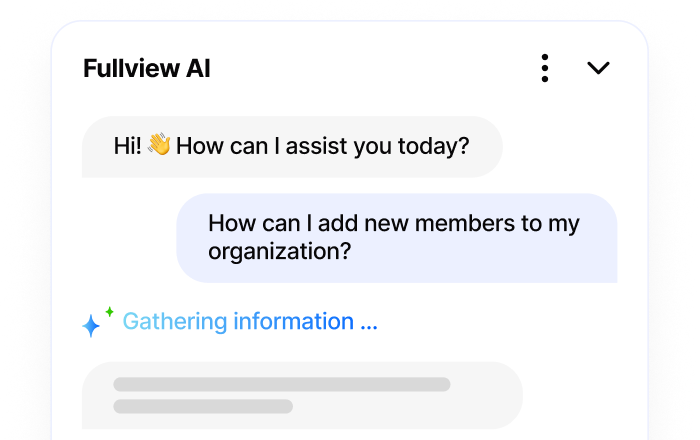As customer expectations, competition, and technology evolve, businesses know that focusing on customer experience is becoming increasingly important. In fact, 73% of consumers say that customer experience is a deciding factor when making purchase decisions, which is why understanding what customer experience is and the role that customer success plays in it can be critical for businesses.
So, what exactly is customer experience? And in what ways does customer success contribute to it?
In this article, we'll cover:
- What customer experience is
- Customer experience vs customer support
- Customer experience vs customer success
- A brief overview of the most common customer experience positions
- Reasons why good customer experience is so crucial for businesses and
- Ways to improve your customer experience
What is customer experience?
.png)
So what is customer experience, anyway?
Simply put, customer experience or CX is the overall impression a person has when interacting with a company's brand, product, or service.
This includes all aspects of the customer journey from awareness to purchase and beyond, including but not limited to:
- How customers feel while they interact with your business
- What kind of interactions they have with your team
- What their experience was like using your product
- What kind of follow-up customer service they receive
Customer experience vs customer success
Customer success is what keeps customers satisfied and engaged while they are using your product or service. It's all about anticipating questions or issues that customers may have and proactively helping them achieve their goals. It also involves tracking customer data, monitoring usage patterns, and giving personalized recommendations to help drive sales and engagement.
While customer success is an essential part of CX, it should not be confused with customer experience as it's more limited in scope.
Customer experience vs customer support
It is important to note that customer experience is not the same as customer support or tech support. While both are important, they should be considered separately. Customer experience focuses on how the customer feels throughout their journey, while customer support focuses on what kind of help they receive when experiencing issues with your product or service.
For example, a customer might have a great experience using your product, but if they face technical issues and the customer service team doesn't help them resolve the issue quickly, then their overall experience may be negative.
How to measure your customer experience?
In order to measure a customer's experience, you can use surveys, customer feedback forms, customer support tickets, and other CX metrics to gain insights into what your customers think of their experience.
Some of these metrics include:
- CSAT
- NPS
- CES
- Customer retention rate
- Customer churn
- First response time
- Average time to resolution
- Ticket volume
- Ticket backlog
- User journeys
- Funnel completions
CX is the overall impression a person has when interacting with a company's brand, product, or service.
Common customer experience positions
In order to create a great customer experience, there are typically multiple team members needed.
Here are the most common customer experience positions:
- Customer support specialists
- Customer service representative
- Call center agent
- Customer support engineer
- Customer journey manager
- Customer success manager
- Customer experience manager
- CX operations
- CX admin
- Digital Strategist
- Chief Customer Officer (CCO)
Why customer experience is crucial to your business
Now that you have an understanding of what customer experience is, let's look at why it is so important. Here are the ten key reasons why customer experience should be a priority for any business:
- It reduces customer churn: Did you know that it costs between 6 to 7 times more to get a new customer vs. keeping the customers you already have? By focusing on customer experience, you can ensure that your customer retention rate is high, leading to increased revenue and cost savings.
- It improves employee retention: When employees feel supported to help customers and have the proper tools to do so, they will be more likely to stay with the company.
- It increases referrals: Research has found that satisfied customers are likely to share their experiences with up to nine people, while dissatisfied customers may tell twenty or more. Therefore, every effort should be made to ensure that customer experiences are positive.
- It adds brand value: When customers have a great experience with your business, it can create a strong emotional connection to the brand that translates into loyalty.
- It builds loyalty: When customers have a great experience, they will be more likely to return for future purchases and refer you to friends and coworkers.
- It sets you apart from your competitors: Consumers today have more options than ever before when it comes to what companies they choose to buy from. This means that businesses must prioritize customer experience in order to stand out from the competition and create a unique experience for their customers.
- It increases customer lifetime value: When customers are loyal and return to purchase more products or services, the customer lifetime value (CLV) increases.
- It helps improve your products and services: By listening to what customers are saying about their experiences and what they would like to see improved, companies can continuously improve their products and services.

How to improve customer experience
The average churn rate is about 10-14% annually for SaaS companies — but ones that nail their customer experience often do a fair bit better than that. By catering their customers and honing in on what it takes to create the best experiences for them, they make it that much less attractive to deflect to someone else.
In today’s digital age, customers are used to getting what they want, when they want it, and how they want it. So companies need to do whatever it takes to make sure they’re meeting those demands.
Here are some tried-and-true ways to improve your customer experience:
- Make sure your website is user-friendly
- Offer omni-channel support
- Lower your time-to-resolution
- Improve your customer support
- Listen to and implement feedback
- Personalize your customer experiences
- Create a consistent brand experience
- Offer support proactively
Make sure your website is user-friendly
Have you ever had the experience of landing on a website and bouncing almost immediately because it’s just not up to standard? That could mean a bunch of things:
- The website doesn't immediately give you a sense of what it does
- The UI is confusing and chaotic
- The CTAs are too aggressive — or non-existent
- The load times are too slow
- The navigation is unintuitive
- Be proactive
There are a lot of ways to make the experience of using a website frustrating, so make sure you don’t set those traps for yourself — or your user.
Your copy should be clear, your navigation should be obvious and your design should be pleasant — not generic enough to be boring, not crazy enough to be an eyesore.
Offer omni-channel support
Everyone is more online than ever before, so it’s important to meet your customers where they are. B2B CX is quickly evolving past the usual subjects; your ICP is now everywhere. From Reddit forums, to Slack Channels to LinkedIn groups, people expect to be able to get in touch with you where and when they like. So make sure you’re present on as many channels as possible, while keeping your messaging, CX and brand consistent across all of them. Make sure to also cover all your support and communication bases, where possible: from live chat, to phone support, to help centers, to social media, make it easy for customers to solve their problems and they’ll stick around for the long haul.
Lower your time-to-resolution and FRT
No one likes to be left hanging and longer hold times lead to lower CSAT scores, so make sure you’re doing everything possible to minimize your time to resolution and first response time— or, at the very least, setting the right expectations about when customers will hear from you. The best way to nail this is to perfect your customer support workflows and use software that is specifically designed to make the processes easier to manage.
Improve your customer support
Excellent customer support is the cornerstone of any great CX setup. And it encompasses a variety of things: from the right tech stack, to the right training, to the right data strategy, customer support is so much more than just resolving support tickets. When done right, it can contribute to your overall customer experience objectives. We’ve covered all the best ways to improve your customer support before, so make sure you read that to get the low-down on how to set yourself up for success.
Implement customer feedback
One of the best ways to improve your CX is also one of the most obvious: when a customer expresses disappointment (or praise!), listen and identify what you can take away from that to improve your processes and workflows. If you’re working with a dearth of unsolicited feedback, reach out to customers and ask them for their opinion. If you’re looking to test new experiments in CX before setting them live, platforms like wynter.com are great places to put new CX hypotheses in front of your ICPs and get their opinion on them. It’s expensive, but it can help you avoid even more costly mistakes down the line.
Personalize your customer experiences
No one likes to feel like a number on a spreadsheet — or an obvious merge tag, so, where possible, make sure you go the extra mile to personalize all your customer interactions to make them memorable. Just be aware that there are ways to do this correctly and ways to do this incorrectly. Customers are more privacy-conscious than ever before, so a delicate balance needs to be deployed in order to make this effort successful rather than off-putting.
Create a consistent brand experience
We’ve touched on this in the point about multi-channel support, but it bears repeating: customers value consistency and it can go a long way towards building your brand. If you do go the multi-channel CX route (and of course you should — it’s only natural that your customer journey is going to have multiple touchpoints), it’s important that you standardize the experience as much as possible. The biggest brands in the world invest a lot in a consistent customer experience, so make sure you’re doing that too.
Some low-hanging fruit you can pluck to get there? Templates, handbooks, corporate guidelines. Everything that you can put down on paper and formalize can take you a long way towards creating consistent experiences across channels.
Be proactive

One of the scariest facts that CX professionals have to contend with is the fact that out of every 26 customers, only one will complain about a bad experience. The rest will just churn without saying anything at all. That’s a problem. If you don’t know when someone’s unhappy with your company, how are you meant to assuage those concerns?
Investing in proactive support and CX can go a long way towards ensuring you don’t miss a single unsatisfied customer. We’ve put together a presentation about proactive support with a ton of tips, tricks and tech recommendations, so make sure you take a look.
Another thing you can do? Invest in software like Fullview Replays to automatically record all user sessions in your app, get notified when someone is displaying signs of frustration (like rage clicks) or experiencing bugs, and get in touch with them even before they ask themselves ‘Where’s the help center?’
Conclusion
Customer experience is essential in creating a strong brand and increasing customer loyalty. By focusing on providing an exceptional customer experience, businesses can create positive brand awareness, set themselves apart from competitors, increase customer lifetime value and improve their offerings.


.png)





.webp)
